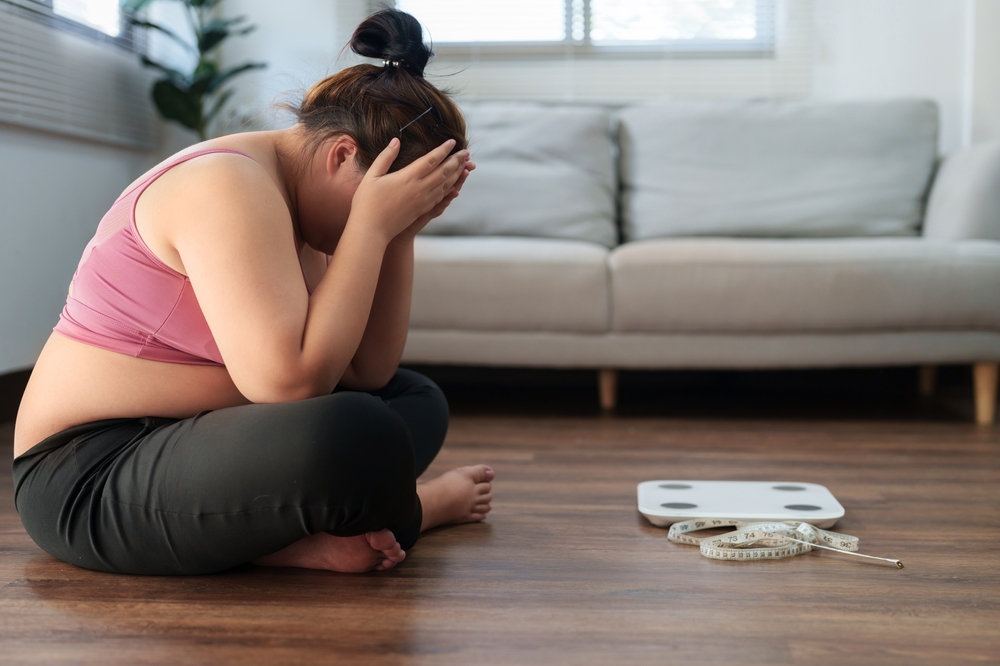Exploring the interlinking between eating disorders and depression
Feelings of sadness from life’s difficult moments or from a traumatic event is absolutely normal. However, when feelings of hopelessness and questions about your self-worth arise when you’re also struggling with your weight and self-image lead professionals to consider that you may have what’s called a “co-occurring disorder”.
Co-occurring disorders (mental health issues that occur alongside one another, such as an eating disorder and depression) can have lifelong mental and physical consequences if individuals do not seek the treatment they need and deserve.
If you notice that you feelings of sadness or depression are connected to how you feel about your body, it’s possible that an eating disorder and depression are both happening for you.

And as much as people wish it were possible, the Internet cannot diagnosis you. To get a proper assessment, you need to see a doctor or contact us for help. But either way, knowing what is going on for each aspect of your mental help is very important for your health and well-being.
Let’s start at the beginning…
What is an Eating Disorder?
According to the National Association of Anorexia and Associated Disorders, about 30 million people of all ages and genders in the United States suffer from an eating disorder. An eating disorder is an illness that is caused by multifaceted mental, physical, and social factors. Eating disorders are typically a result of a negative self-image, societal expectations, or social pressures that cause unwanted stress and feelings of self-doubt about one’s image.
Individuals with an eating disorder are often consumed by stress in their environments and engage in destructive eating behaviors as a coping mechanism to battle through difficult moments. They often have a distorted or unrealistic self-image and experience a cycle of guilt and stress from unwanted thoughts about food and their weight. This obsession to achieve the ‘perfect body image’ can lead to feelings of hopelessness and questions of self-worth.
People with eating disorders don’t always manage their relationship with food in the same way. Below you’ll find a more detailed breakdown of the various eating disorders and how they show up in a person’s life.
What is Depression?
Depression is a mood disorder that is characterized by chronic levels of sadness, feelings of hopelessness, anxiety, and guilt. Depression affects the ways in which a person thinks, behaves, and feels and can ultimately lead to suicidal thoughts. The causes of depression can be linked to a combination of genetic and environmental factors.
According to the National Institute of Mental Health, the following are the signs and symptoms of depression:
Long-lasting feelings of sadness or anxiousness
Having an empty mood
Feelings of hopelessness or worthlessness
Having difficulty concentrating or making rational decisions
Feeling lethargic
Having difficulty sleeping
Changes in appetite or weight
Declining physical appearance
Withdrawal from previously enjoyed activities
Removal from social groups or family
Exhibiting low levels of self-esteem
Experiencing suicidal thoughts/attempts
When individuals are diagnosed with an eating disorder and depression, they find themselves trapped in an endless cycle of sadness and guilt because they struggle to achieve their ‘ideal body type’. Getting informed about the detrimental effects eating disorders and depression can have on your life will encourage you or someone you love get the help needed to overcome both disorders.
When eating disorders and depression are co-occurring, you will find experiences like the following happening in a person’s life.
Anorexia Nervosa and Depression
Individuals diagnosed with anorexia nervosa often experience a negative self-image and believe they appear overweight. This causes the person with this belief set to have an unhealthy relationship with food and leads to the under consumption of calories needed to maintain a healthy body and weight.
This is different from dieting. It can involve everything from reduced calories at meals to refusing to eat altogether. In serious cases, individuals may not consume any calories at all and may experience serious health problems that can ultimately be fatal. If you, or someone you know is experiencing eating in this way, that is a sign to get some help. Reach out to us today for a complimentary consultation to explore options for help and guidance.
Additionally, when someone experiences long-lasting feelings of sadness or questions their self-worth, they may also be showing signs of depression. Questioning your value while also feeling hopeless can cause you to restrict your caloric intake to as a coping mechanism to feel better by achieving your ‘ideal body weight’. The obsession over the perfect body weight and self-image can completely overcome a person’s mind and can lead to negative thoughts and potentially destructive behaviors.
Bulimia Nervosa and Depression
Individuals diagnosed with bulimia nervosa are often characterized by engaging in a bingeing and purging cycles. Binges (large consumptions of food) are often completed in secret, making it harder to see or identify. Binge cycles are followed by purging behaviors that range from vomiting to using laxatives, exercising excessively, or fasting in an unhealthy way.
People with bulimia typically feel unhappy about their weight and use this binge/purge cycle to cope with the stress they feel around their body image, compulsive behaviors or even the shame that comes after eating a large amount of food or high caloric foods.
People with bulimia nervosa can have a co-occurring diagnosed of depression because the repetitive cycles of binging and purging can cause never-ending feelings of shame and sadness. The constant fluctuation in weight and eating patterns can cause individuals to give up on achieving their ideal weight and can lead to social withdrawal and intense feelings of anxiety.
Binge Eating Disorder (BED) and Depression
Binge eating disorder is often characterized by eating too much food in a very short amount of time to the point where individuals feel sick or uncomfortably full. Individuals diagnosed with binge-eating disorder often appear overweight or obese. This diagnosis isn’t accompanied with purging but does have the secrecy element as many people with binge-eating disorder don’t want to show this side of their behavior to others.
Being secretive also comes with a price and for many, this can bring on depression or depressive symptoms as well. BET is often used as a coping mechanism in response to social and environmental stressors, so the accompanying feelings of intense guilt and shame are common. These negative feelings persist as long as the binge eating occurs leading often to deeper depression.

To overcome both binge eating and depression, individuals must learn how to take care of themselves in a healthier way, which often involves therapy and treatment as warranted by the severity of the situation.
Seeking Effective Treatment
Beginning the healing process is essential for individuals struggling with an eating disorder and depression. The only way to truly restore the individual’s mind, body, and spirit back to its healthy state is to seek a treatment recovery plan that emphasizes whole person care.
Eating Disorder Recovery Specialists are highly trained professionals who are equipped to help individuals establish self-soothing techniques, meal plans, and personalized coping mechanisms. You can reach out to us today for a complimentary consultation.
Our specialists support clients through methods such as Cognitive Behavioral Therapy (CBT) or Dialectical Behavior Therapy (DBT) which are best-practices to treat any co-occurring disorder. Specialists empathize with each patient and create a personalized recovery plan that fits the needs of every individual.
Updated: 12/28/23
Greta Gleissner is the Founder of Eating Disorder Recovery Specialists, a nationwide network of eating disorder treatment specialists that provide meal coaching and recovery skills such as CBT, DBT, ACT, MI, etc. EDRS works alongside treatment programs, teams and families to provide transitional aftercare support for post-residential treatment clients. Reach out if you or your loved one needs help today.

